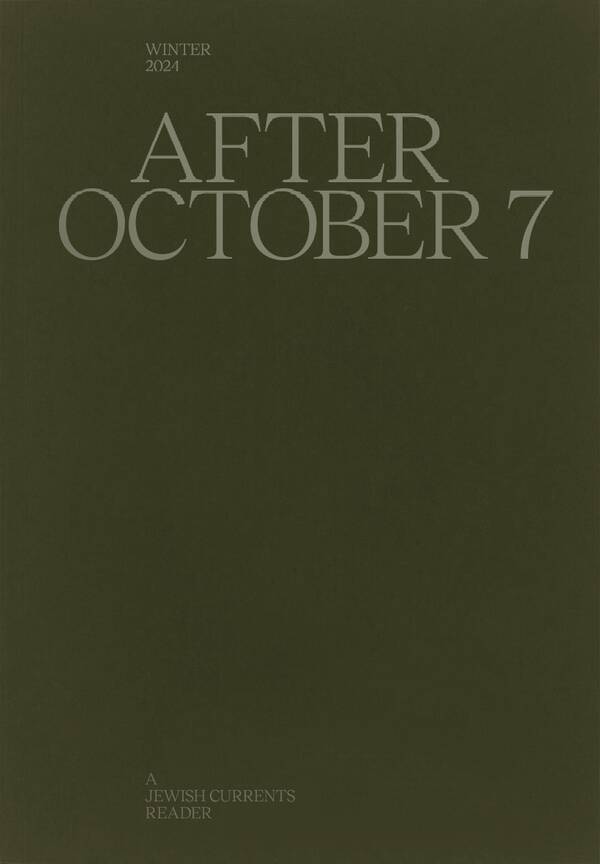Letters from Our Readers
On “In Internal Memo, American Jewish Committee Blasts Op-Ed on ‘Jewish-Free Zones’ at Berkeley Law”
Your article about the University of California Berkeley School of Law erroneously states that Kenneth Marcus “pioneered” the “strategy” of filing civil rights complaints using Title VI of the Civil Rights Act to remedy campus environments that are hostile to Jewish students. While Marcus has surely been an impactful advocate for Jewish students, it was the Zionist Organization of America... more
Susan B. Tuchman
New York, New York
New York, New York
On “The Mapping Project” Podcast
The June 30th podcast episode raised concerns about The Mapping Project—an anonymous activist effort aiming to document, in their words, "local [Massachusetts] institutional support for the colonization of Palestine and harms that we see as linked," including US colonialism and imperialism—interrogating its specific political purpose or utility for political organizing. These important questions notwithstanding, I was struck by the sheer... more
Brendan O'Connor
Northampton, Massachusetts
Northampton, Massachusetts
On “Against Impossibility”
Despite enjoying Helen Betya Rubinstein’s review of Maria Stepanova’s In Memory of Memory, I came away thinking that it rests on a misreading of Stepanova, W.G. Sebald, and Saidiya Hartman, and their ostensibly opposed conceptions of the narration of lost histories. Rubinstein sees Hartman’s “critical fabulation,” a narrative technique for telling fully human stories about those whom history has tried... more
Jack Hanson
Brooklyn, NY
Brooklyn, NY
On “Rehearsing Defeat”
In a recent essay on the state of abortion and reproductive justice organizing, Arielle Angel bemoans a depressingly tame rally held at Foley Square the day after the leak of the Supreme Court memo, offering up a “fantasy in which leftists and liberals band together to suspend business as usual. Clinic defense, yes, but also, offense. Occupy the statehouses in... more
Safia Albaiti, Camila Valle, and Nantina Vgontzas
New York, NY
New York, NY
On “The Politically Expedient Jewishness of Éric Zemmour”
In Mitchell Abidor and Miguel Lago’s recent article, “The Politically Expedient Jewishness of Éric Zemmour,” the authors neglect an issue that is central to the subject at hand: Zemmour’s specifically Algerian Jewish ancestry, which is mentioned only in passing. This is far from a mere biographical detail. Rather, understanding Zemmour’s particular background makes him much more legible as a far-right... more
Ilan Benattar
Los Angeles, CA
Los Angeles, CA
On “Travesty Show”
I've never set foot in Ukraine, and yet I grew up in its shadow in southern Brooklyn. Much like the actual Ukraine is missing from my life as a post-Soviet Jew, there's something of Ukrainian Jewry that is distinctly lacking from Nicholas Muellner and Helen Betya Rubinstein’s essay “Travesty Show.” One has to ask of Muellner and Rubinstein’s young Ukrainian... more
R. Terdiman
Brooklyn, NY
Brooklyn, NY
On “From Minneapolis to Jerusalem”
The Fall 2021 issue of Jewish Currents featured an excellent article by Hannah Black, “From Minneapolis to Jerusalem: On Black-Palestinian Solidarity.” Readers who want to dig deeper into the subject would do well to consult historian Michael R. Fischbach’s two-volume study, Black Power and Palestine: Transnational Countries of Color and The Movement and the Middle East: How the Arab-Israeli Conflict... more
Rod Such
Portland, Oregon
Portland, Oregon
On “When Settler Becomes Native”
As someone who is both Jewish and Native (Quechua), I greatly appreciated “When Settler Becomes Native” in your Fall issue. It’s a concise but thorough resource that I will definitely be recommending. Unfortunately, the piece also engages in Indigenous erasure and anti-Native language. Firstly, the piece suffers from an overall failure to mention Native/Indigenous Jews. Jewish Natives are already invisibilized... more
Daniel Delgado
Chuk’shon, O’odham Jewed (Tucson, AZ)
Chuk’shon, O’odham Jewed (Tucson, AZ)
I found JB Brager's recent comic interesting and engaging, but I'm frustrated by the discussion of this issue as a simplistic binary: either Jews are Indigenous to Palestine and are therefore entitled to a Jewish state while Palestinians have no such right, or Jewish claims of indigeneity to Palestine are entirely invalid. Why can't Israeli Jews and Palestinians both legitimately... more
Robert Kirchner
Amiskwaciwâskahikan (Edmonton, Canada)
Amiskwaciwâskahikan (Edmonton, Canada)
The recent comic "When Settler Becomes Native" speaks to important issues around Jewish claims to indigeneity in Israel. However, a Mizrahi friend brought to my attention that it would have been more appropriate to depict Ashkenazi activists making these claims. Pointing to comments made by Hen Mazzig and Rudy Rochman, two Mizrahi Jews, can be experienced as racist, leaving much... more
Rebekah Erev
Squaxin, Nisqually, Chehalis land (Olympia, WA)
Squaxin, Nisqually, Chehalis land (Olympia, WA)
I appreciate the tremendous work that went into pulling together many complex strands in the comic “When Settler Becomes Native.” In my organizing with Jews on Ohlone Land and in my studies of Jewish relationships with Indigenous people, I’ve circled around similar topics. What I feel is often missing from these conversations, and is absent from JB Brager’s comic, is... more
Leora Cockrell
Huichin (Berkeley, CA)
Huichin (Berkeley, CA)
On “What the Record Doesn’t Show”
Vicky Osterweil significantly mischaracterizes Sarah Schulman’s project and arguments in Let the Record Show, Schulman’s history of ACT UP New York released this spring. Osterweil primarily criticizes Schulman’s methods: Let the Record Show draws largely from nearly 200 interviews with surviving members of ACT UP New York, and Osterweil believes this skews the book’s focus toward the “cis white gay... more
Kay Gabriel
Brooklyn, NY
Brooklyn, NY
On “On Loving Jews”
I enjoyed Arielle Angel’s recent essay, “On Loving Jews.” But I would like to add one point. Angel is correct that Gershom Scholem’s concept of “ahavath Israel, or love for the Jewish people,” does not appear in the Bible, but nor does it originate in a commentary to Leviticus. In fact, it appears nowhere in classical rabbinic literature. Many rabbis... more
Raffi Magarik
Chicago, Illinois
Chicago, Illinois
There is one highly pertinent point which I found sorely lacking in Arielle Angel’s otherwise thought-provoking text: that opposition to Zionism can actually be motivated by—be an expression of—concern for collective Jewish safety. This was a major theme of Jewish opposition to Zionism long before the formation of the State of Israel, which many Jews warned would bring new dangers... more
Michael Sappir
Leipzig, Germany
Leipzig, Germany
On “Reclaiming the Covenant of Fate”
I relate to Peter Beinart’s grief at the fractures now cracking the surface of Jewish communal life. But in painting the picture of a bridge that needs crossing from two sides, he provides a deeply unsatisfying solution to the critical issues at the heart of this divide. While I appreciate Beinart’s insistence that Jewish institutions “grant a platform” to the... more
Stefanie Fox
Seattle, Washington
Seattle, Washington
On “The Rise and Fall of the Coops”
I just finished reading “The Rise and Fall of the Coops” and I thought it was a great, well-written article. I was born and raised in the Coops, so it brought back many memories. They really captured the true picture. Workers built these houses for a better life. The Jewish culture and history was the mainstay of the buildings and... more
Brenda Neuman
Bridgeport, CT
Bridgeport, CT
The year given in the caption of the photo of the Coops kindergarten on page 102 of your Fall 2020 edition is in error. The year was 1934 or ‘35, more likely the latter. I know because I am the child seated in the front row, center, to the left of the blond youngster. In the year given, 1932, I... more
Hershl Hartman
Los Angeles, CA
Los Angeles, CA
On Geographic Chauvinism
The recent Housing issue of Jewish Currents suffers from the same malaise as much of the magazine’s commentary: a narrow focus on greater New York City. One cannot generalize definitive knowledge about urbanization under capitalism from just New York’s case. At this juncture in history, mulling over displacement, gentrification, and housing organizing in the five boroughs does not constitute a... more
Stephen Averill Sherman
Houston, TX
Houston, TX

